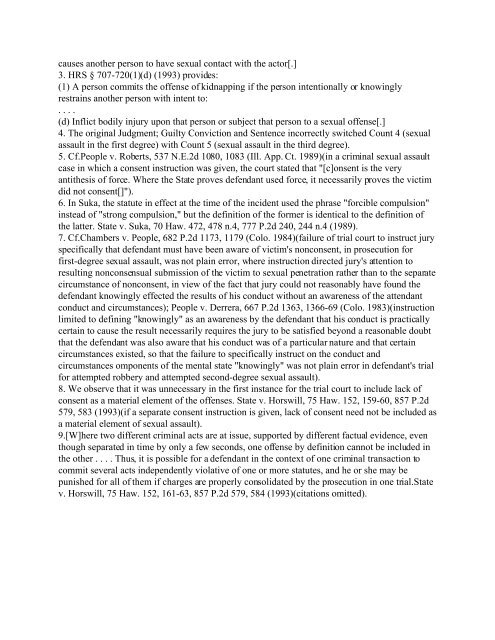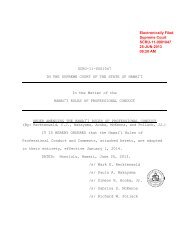standards of review. - State of Hawaii
standards of review. - State of Hawaii
standards of review. - State of Hawaii
Create successful ePaper yourself
Turn your PDF publications into a flip-book with our unique Google optimized e-Paper software.
causes another person to have sexual contact with the actor[.]<br />
3. HRS § 707-720(1)(d) (1993) provides:<br />
(1) A person commits the <strong>of</strong>fense <strong>of</strong> kidnapping if the person intentionally or knowingly<br />
restrains another person with intent to:<br />
. . . .<br />
(d) Inflict bodily injury upon that person or subject that person to a sexual <strong>of</strong>fense[.]<br />
4. The original Judgment; Guilty Conviction and Sentence incorrectly switched Count 4 (sexual<br />
assault in the first degree) with Count 5 (sexual assault in the third degree).<br />
5. Cf.People v. Roberts, 537 N.E.2d 1080, 1083 (Ill. App. Ct. 1989)(in a criminal sexual assault<br />
case in which a consent instruction was given, the court stated that "[c]onsent is the very<br />
antithesis <strong>of</strong> force. Where the <strong>State</strong> proves defendant used force, it necessarily proves the victim<br />
did not consent[]").<br />
6. In Suka, the statute in effect at the time <strong>of</strong> the incident used the phrase "forcible compulsion"<br />
instead <strong>of</strong> "strong compulsion," but the definition <strong>of</strong> the former is identical to the definition <strong>of</strong><br />
the latter. <strong>State</strong> v. Suka, 70 Haw. 472, 478 n.4, 777 P.2d 240, 244 n.4 (1989).<br />
7. Cf.Chambers v. People, 682 P.2d 1173, 1179 (Colo. 1984)(failure <strong>of</strong> trial court to instruct jury<br />
specifically that defendant must have been aware <strong>of</strong> victim's nonconsent, in prosecution for<br />
first-degree sexual assault, was not plain error, where instruction directed jury's attention to<br />
resulting nonconsensual submission <strong>of</strong> the victim to sexual penetration rather than to the separate<br />
circumstance <strong>of</strong> nonconsent, in view <strong>of</strong> the fact that jury could not reasonably have found the<br />
defendant knowingly effected the results <strong>of</strong> his conduct without an awareness <strong>of</strong> the attendant<br />
conduct and circumstances); People v. Derrera, 667 P.2d 1363, 1366-69 (Colo. 1983)(instruction<br />
limited to defining "knowingly" as an awareness by the defendant that his conduct is practically<br />
certain to cause the result necessarily requires the jury to be satisfied beyond a reasonable doubt<br />
that the defendant was also aware that his conduct was <strong>of</strong> a particular nature and that certain<br />
circumstances existed, so that the failure to specifically instruct on the conduct and<br />
circumstances omponents <strong>of</strong> the mental state "knowingly" was not plain error in defendant's trial<br />
for attempted robbery and attempted second-degree sexual assault).<br />
8. We observe that it was unnecessary in the first instance for the trial court to include lack <strong>of</strong><br />
consent as a material element <strong>of</strong> the <strong>of</strong>fenses. <strong>State</strong> v. Horswill, 75 Haw. 152, 159-60, 857 P.2d<br />
579, 583 (1993)(if a separate consent instruction is given, lack <strong>of</strong> consent need not be included as<br />
a material element <strong>of</strong> sexual assault).<br />
9.[W]here two different criminal acts are at issue, supported by different factual evidence, even<br />
though separated in time by only a few seconds, one <strong>of</strong>fense by definition cannot be included in<br />
the other . . . . Thus, it is possible for a defendant in the context <strong>of</strong> one criminal transaction to<br />
commit several acts independently violative <strong>of</strong> one or more statutes, and he or she may be<br />
punished for all <strong>of</strong> them if charges are properly consolidated by the prosecution in one trial.<strong>State</strong><br />
v. Horswill, 75 Haw. 152, 161-63, 857 P.2d 579, 584 (1993)(citations omitted).
















